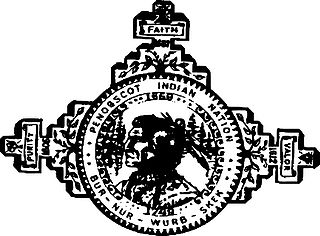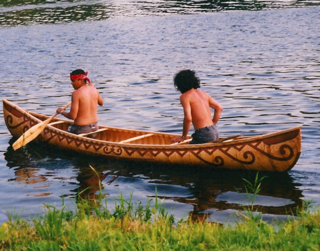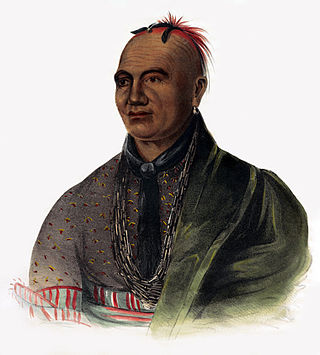Related Research Articles

The Abenaki are Indigenous people of the Northeastern Woodlands of Canada and the United States. They are an Algonquian-speaking people and part of the Wabanaki Confederacy. The Eastern Abenaki language was predominantly spoken in Maine, while the Western Abenaki language was spoken in Quebec, Vermont, and New Hampshire.

The Penobscot are an Indigenous people in North America from the Northeastern Woodlands region. They are organized as a federally recognized tribe in Maine and as a First Nations band government in the Atlantic provinces and Quebec.

The Passamaquoddy are a Native American/First Nations people who live in northeastern North America. Their traditional homeland, Peskotomuhkatikuk, straddles the Canadian province of New Brunswick and the U.S. state of Maine in a region called Dawnland. They are one of the constituent nations of the Wabanaki Confederacy.

The Wolastoqiyik, also Wəlastəkwewiyik, Malecite or Maliseet are an Algonquian-speaking First Nation of the Wabanaki Confederacy. They are the Indigenous people of the Wolastoq valley and its tributaries. Their territory extends across the current borders of New Brunswick and Quebec in Canada, and parts of Maine in the United States.

Cadillac Mountain is located on Mount Desert Island, within Acadia National Park, in the U.S. state of Maine. With an elevation of 1,530 feet, its summit is the highest point in Hancock County and the highest within 25 miles (40 km) of the Atlantic shoreline of the North American continent between the Cape Breton Highlands, Nova Scotia, and peaks in Mexico. It is known as the first place in the continental U.S. to see the sunrise, although that is only true for a portion of the year.

The Algonquians are one of the most populous and widespread North American indigenous North American groups, consisting of the peoples who speak Algonquian languages. They historically were prominent along the Atlantic Coast and in the interior regions along Saint Lawrence River and around the Great Lakes.

The Maine House of Representatives is the lower house of the Maine Legislature. The House consists of 151 voting members and three nonvoting members. The voting members represent an equal number of districts across the state and are elected via plurality voting. The nonvoting members represent three of Maine's Native American tribes, though two tribes have declined to send representatives. Each voting member of the House represents around 9,000 citizens of the state. Because it is a part-time position, members of the Maine House of Representatives usually have outside employment as well. Members are limited to four consecutive terms of two years each, but may run again after two years.

Indigenous peoples of the Northeastern Woodlands include Native American tribes and First Nation bands residing in or originating from a cultural area encompassing the northeastern and Midwest United States and southeastern Canada. It is part of a broader grouping known as the Eastern Woodlands. The Northeastern Woodlands is divided into three major areas: the Coastal, Saint Lawrence Lowlands, and Great Lakes-Riverine zones.
Etchemin was a language of the Algonquian language family, spoken in early colonial times on the coast of Maine. The word Etchemin is thought to be either French alteration of an Algonquian word for 'canoe' or a translation of Skidijn, the native word for people in use by the inhabitants of the St. John, Passamaquoddy and St. Croix Rivers.

The Wabanaki Confederacy is a North American First Nations and Native American confederation of five principal Eastern Algonquian nations: the Abenaki, Mi'kmaq, Wolastoqiyik, Passamaquoddy (Peskotomahkati) and Penobscot.

Mihku Paul is a First Nations poet, visual artist, storyteller, and activist. She was born into the Maliseet Nation and she is a member of Kingsclear First Nation in New Brunswick, Canada. Mihku Paul currently resides in Portland, Maine where she teaches creative writing at the Maine Women Writers Collection at the University of New England.

The Houlton Band of Maliseet Indians of Maine (HBMI) is a federally recognized tribe of Maliseet, whose land is along the Meduxnekeag River in Maine, United States. They are headquartered in Littleton, Maine, located in Aroostook County.
Concouguash, Christian name Francis Joseph Neptune, (1735–1834) was chief of the Passamaquoddy tribe during the American Revolutionary War. He succeeded his father, Bahgulwet, who died in 1778, and was succeeded by his own son, John Francis Neptune, in 1824. The term "chief" later became the word for governor. Becoming chief is passed along through family lineage and requires acceptance from the Passamaquoddies, Penobscots and Maliseet tribes. These three tribes share similar chief induction ceremonies, conducted simultaneously with eyewitnesses from each tribe present.
Donald Soctomah is a Native American author, filmmaker, historian, and politician. He serves as the tribal historic preservation officer for the Passamaquoddy tribe, where he works with both the U.S. and Canadian governments on the protection of culturally significant sites, artifacts and knowledge. Soctomah has written several books about Passamaquoddy history, as well as a children's book, Remember Me: Tomah Joseph's Gift to Franklin Delano Roosevelt and The Canoe Maker.
Jesse Bowman Bruchac is an author and language teacher from the Nulhegan Band of the Coosuk Abenaki Nation, a state-recognized tribe in Vermont. He has dedicated much of his life to studying the Abenaki language and preserving the Abenaki culture. He created the first Abenaki language website.
The Maine Wabanaki-State Child Welfare Truth and Reconciliation Commission, also known as the MWTRC, was a commission looking at events relating to Wabanaki children and families from 1978, when the Indian Child Welfare Act (ICWA) was passed, until now. The Commission was officially established on February 12, 2012 and issued its final report on June 14, 2015. The MWTRC's mandate was to find Truth, Healing, and Change by giving the Wabanaki people and others involved within the Maine Child Welfare System a place to voice their stories and experiences. The final report addressed findings made by the commission and provided recommendations to improve compliance with the ICWA.

The Maritime Peninsula is a region of eastern North America that extends from the Kennebec River in the U.S. state of Maine northeast to the Maritime provinces of Canada and Quebec's Gaspé Peninsula. It is bounded by the Gulf of St. Lawrence to the north and the Gulf of Maine to the south.
Rena D. Newell is a Passamaquoddy politician who is serving as the incumbent chief of the Passamaquoddy Tribe at Sipayik. Previously, she was the Passamaquoddy tribal representative to the Maine House of Representatives during the 129th and 130th legislatures. During her two terms, she was the only tribal representative in the Maine House.
David Moses Bridges was a Native American environmentalist and artist known for his traditional birchbark canoes and baskets. He was a member of the Passamaquoddy tribal community on the Passamaquoddy Pleasant Point Reservation. Bridges fought for tribal environmental rights and was a co-founder of Mulankeyutmonen Nkihtakmikon, to preserve the Wabanaki culture.
References
- 1 2 3 4 Senier, Siobhan (2014). Dawnland Voices An Anthology of Indigenous Writing from New England. United States: Board of Regents of the University of Nebraska. p. 170.
- ↑ Mitchell, Lewis. "Speech by Lewis Mitchell Before the 63rd Mainse State Legislature, 1887". Abbe Museum. Archived from the original on 2014-10-18. Retrieved 2015-05-07.
- ↑ Senier, Siobhan (2014). Dawnland Voices (1st ed.). Lincoln and London: University of Nebraska Press. p. 170. ISBN 978-0-8032-4686-7.
- 1 2 3 4 5 6 7 8 Swann, Brian (2005). Algonquian Spirit Contemporary Translations of the Algonquian Literatures of North America . United States: Board of Regents of the University of Nebraska. p. 100.
- 1 2 3 4 Prince, John Dyneley. Passamaquoddy Texts (Volume X ed.). New York: American Ethnological Society. Retrieved 23 April 2015.
- 1 2 3 4 "Guiding Services for Sport Hunters". Mount Desert Island: Shaped by Nature. Maine Memory Network.